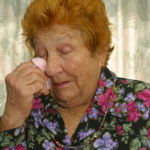 It’s part of life. As we age, we are forced to deal with a greater number of serious emotional losses. Most elderly people must face a variety of different losses. Do your CNAs know how to help their elderly clients deal with those losses? At your next CNA inservice meeting, consider using the following scenario as a way to open a discussion about loss among the elderly.
It’s part of life. As we age, we are forced to deal with a greater number of serious emotional losses. Most elderly people must face a variety of different losses. Do your CNAs know how to help their elderly clients deal with those losses? At your next CNA inservice meeting, consider using the following scenario as a way to open a discussion about loss among the elderly.
Emotional Losses of the Elderly
“In youth, we run into difficulties. In old age, difficulties run into us.”
~Josh Billings
There’s no way around it. Losses are painful and often sad. They represent an end to something—and this ending creates an emotional wound. This is especially true for the elderly who must endure a number of different emotional losses. For example:
- At age 65, Sarah Smith retires from her job. Even though this gives her more free time, she misses the daily contact with her former coworkers. A year later, Sarah’s husband dies. His sudden death leaves her devastated…and in some financial trouble.
- During that same time, Sarah is diagnosed with both diabetes and hypertension. She also develops chronic back pain.
- On her 67th birthday, Sarah receives word that her sister has passed away. Three months later, Sarah’s best friend dies from cancer.
- Six months later, her son decides that she should no longer live alone. He helps Sarah sell her house and moves her into an assisted living facility.
- To the staff at the facility, Sarah seems like a grumpy, forgetful woman who keeps to herself and seems impossible to please. No one is very fond of her. But look at things from Sarah’s point of view. Within two short years, she has lost her work, her friends, her health, her husband and her home. Is it any wonder that she tends to be grumpy and withdrawn?
Just like physical injuries need time to heal…so do emotional wounds. People who spend time grieving are doing what they need to heal their emotional wounds. The only “cure” for grief is to go through the grieving process. People must do this in their own way and at their own pace.
Grieving is hard work and can leave people physically and emotionally exhausted. In the end, the process of grieving encourages people to take charge of their own lives and to move forward.
Would Your Nursing Assistants Like to Know More?
If you’d like to give your CNAs more information about emotional losses, consider presenting an inservice that includes information on:
- The three stages of grief.
- The physical and emotional symptoms of grief.
- The loss of youth.
- The loss of family and friends.
- The loss of work.
- The loss of a spouse.
- The loss of health.
- The loss of independence.
- What your CNAs can do to help clients through these losses.
Don’t have time to put together your own inservice? Then, please check out our inservice called Emotional Losses in the Elderly. It covers all of the above information…and more.
Happy Teaching!


